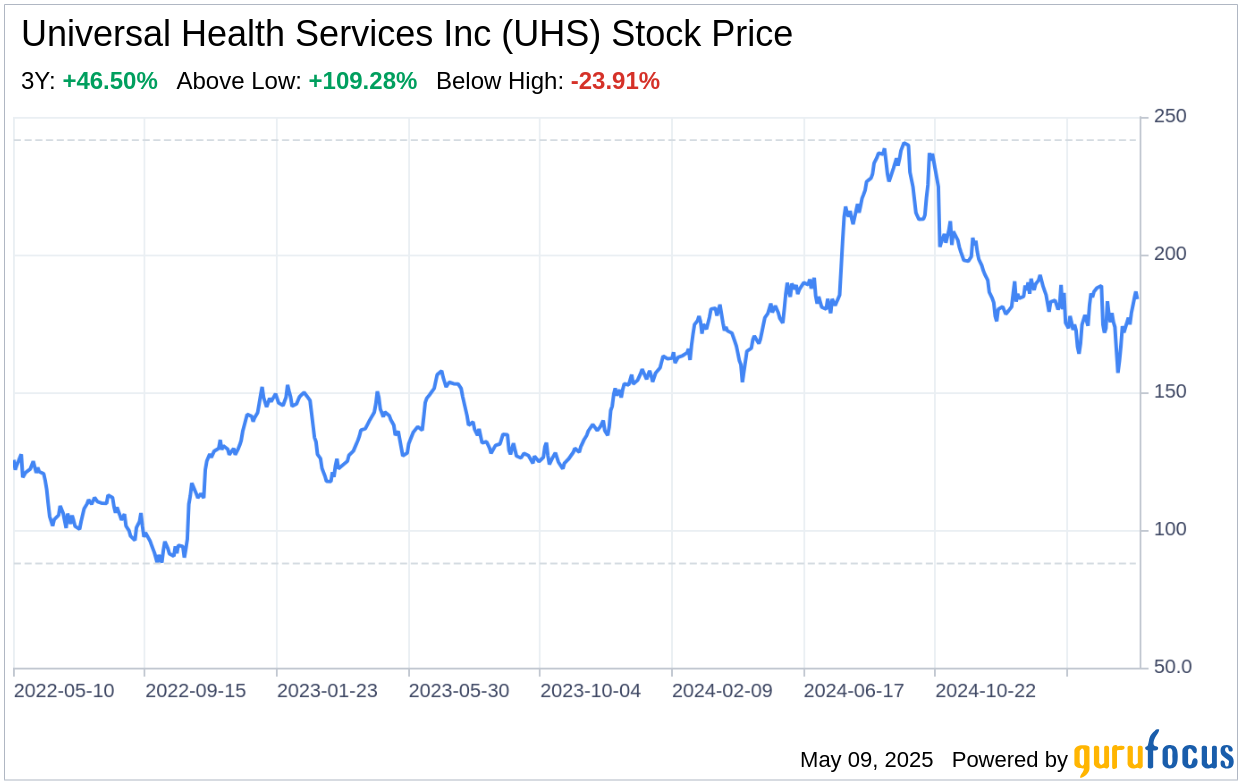Universal Health Services Inc (UHS, Financial), a leading healthcare provider, has recently released its 10-Q filing dated May 8, 2025, offering a detailed look into its financial performance and strategic positioning. The company, which operates acute care hospitals, behavioral health centers, and various other healthcare facilities, has demonstrated a strong financial trajectory, with net revenues increasing from $3.84 million in 2024 to $4.10 million in 2025. This financial overview, derived from the latest SEC filings, sets the stage for a comprehensive SWOT analysis, providing investors with insights into UHS's strengths, weaknesses, opportunities, and threats.

Strengths
Financial Performance and Revenue Growth: UHS has shown a commendable increase in net revenues, marking a 6.7% growth year-over-year. This is a testament to the company's operational efficiency and its ability to attract and retain patients across its service segments. The Acute Care Hospital Services segment, being the primary revenue generator, has been particularly instrumental in driving this growth.
Diversified Service Offerings: UHS's diversified portfolio, which includes acute care hospitals, behavioral health centers, and ambulatory surgery centers, provides a comprehensive range of services. This diversification not only mitigates risks associated with market fluctuations in individual segments but also allows for cross-segment synergies and a holistic approach to patient care.
Strategic Expansion: The company's strategic expansion, including the recent opening of the Cedar Hill Regional Medical Center, demonstrates its commitment to growth and increased market presence. This expansion aligns with the rising demand for healthcare services and positions UHS to capitalize on new market opportunities.
Weaknesses
Operational Costs: Despite revenue growth, UHS faces challenges with rising operational costs, particularly in salaries, wages, and benefits, which have increased by 5.9% from 2024 to 2025. This reflects the broader industry trend of labor-intensive operations and the need for competitive compensation to attract skilled healthcare professionals.
Regulatory and Legal Risks: UHS operates in a highly regulated environment and has faced legal and regulatory challenges, including government investigations and potential non-compliance with healthcare regulations. These challenges not only pose financial risks but also affect the company's reputation and operational stability.
Debt Levels: The company's interest expense, although reduced from the previous year, indicates a level of indebtedness that requires careful management. While UHS has managed its debt effectively, it remains a point of financial vulnerability that must be monitored.
Opportunities
Market Demand for Healthcare Services: The increasing demand for healthcare services, driven by an aging population and greater health awareness, presents significant opportunities for UHS to expand its patient base. The company's well-established presence in acute and behavioral health care positions it to meet these growing needs effectively.
Technological Advancements: The healthcare industry is witnessing rapid technological advancements, offering UHS opportunities to enhance its service delivery through telehealth, electronic health records, and advanced diagnostic tools. Embracing these technologies can improve patient outcomes and operational efficiency.
Strategic Acquisitions and Partnerships: UHS has the opportunity to grow through strategic acquisitions and partnerships, enabling it to enter new markets and offer additional services. Such initiatives can further strengthen its competitive position and drive long-term growth.
Threats
Competitive Pressure: UHS operates in a competitive healthcare market, with numerous players vying for market share. The company must continuously innovate and improve its services to maintain its competitive edge and attract patients in a crowded marketplace.
Regulatory Changes: The healthcare industry is subject to frequent regulatory changes, which can impact reimbursement rates, operational requirements, and compliance costs. UHS must stay vigilant and adaptable to navigate these changes successfully.
Economic Uncertainties: Economic fluctuations can affect patients' ability to afford healthcare services, potentially leading to reduced demand for elective procedures and impacting UHS's financial performance. Additionally, economic downturns can lead to increased bad debt expenses for the company.
In conclusion, Universal Health Services Inc (UHS, Financial) exhibits a strong financial foundation with significant growth in net revenues and a diverse service offering. However, it must address challenges related to operational costs and regulatory risks. The company is well-positioned to seize market opportunities through technological advancements and strategic initiatives, although it must remain cautious of competitive pressures and economic uncertainties. Overall, UHS's strategic focus and operational strengths suggest a positive outlook, provided it effectively navigates the evolving healthcare landscape.
This article, generated by GuruFocus, is designed to provide general insights and is not tailored financial advice. Our commentary is rooted in historical data and analyst projections, utilizing an impartial methodology, and is not intended to serve as specific investment guidance. It does not formulate a recommendation to purchase or divest any stock and does not consider individual investment objectives or financial circumstances. Our objective is to deliver long-term, fundamental data-driven analysis. Be aware that our analysis might not incorporate the most recent, price-sensitive company announcements or qualitative information. GuruFocus holds no position in the stocks mentioned herein.
